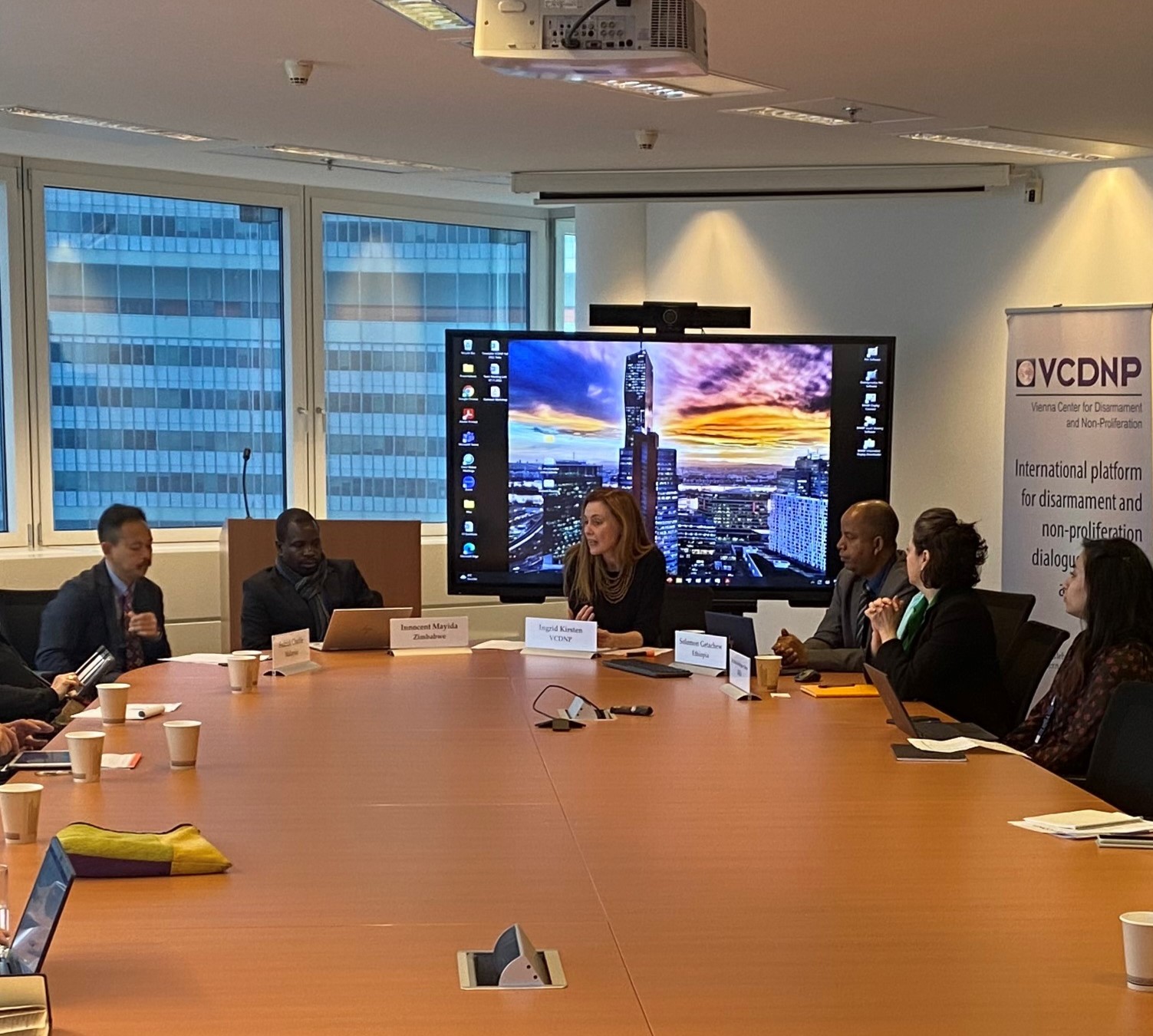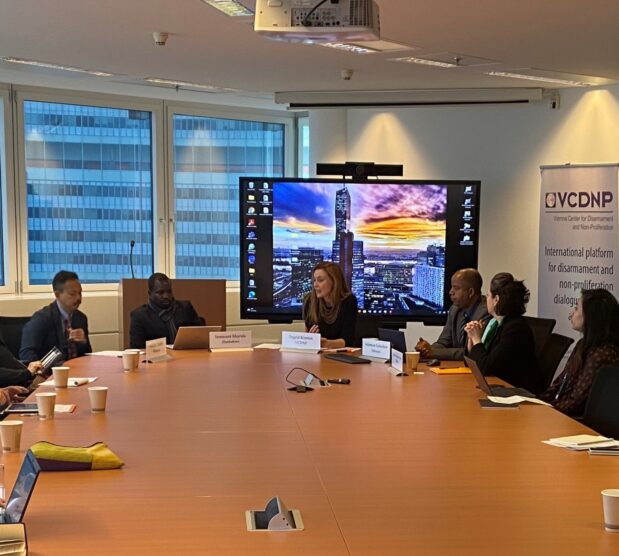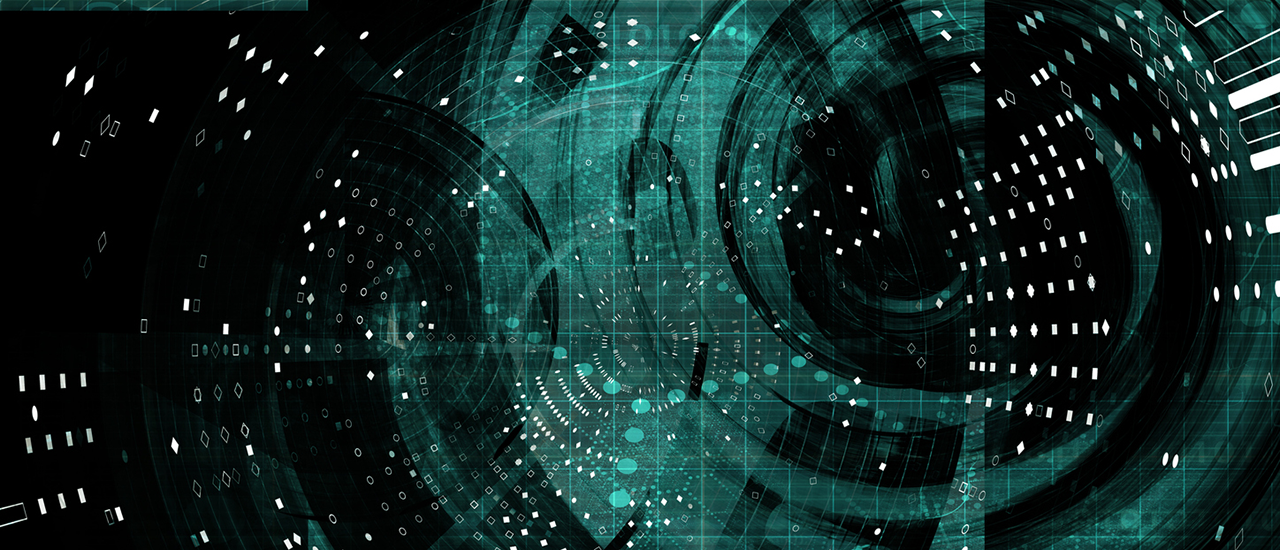
Peaceful uses of nuclear energy, science and technology contribute to healthcare, food security and support economic development. The nuclear regulatory body has an essential role in regulating the safe and secure application of these technologies. On 24 January 2023, the Vienna Center for Disarmament and Non-Proliferation (VCDNP) hosted a panel to discuss the experience of nuclear regulators in Zimbabwe, Ethiopia and Malaysia in addressing nuclear safety and security and the support provided to them by the IAEA. The event was moderated by Ingrid Kirsten, Senior Research Associate at the VCDNP, and attended by representatives from Permanent Missions to the UN organisations in Vienna.
Panellists:
The panellists highlighted the importance of an effective regulatory control system to build confidence in peaceful uses and for the protection of the public and the environment from the adverse effects of radiation. They discussed the challenges faced by regulators in the execution of their duties, the support they received and proposed solution for some of these challenges.

Lack of awareness of the benefits of peaceful uses among policy makers, legislators and the public complicates the work of regulators when they have to convince legislators to draft, enact or amend nuclear legislation. Negative perceptions about everything nuclear can disincentivize action by politicians who often prioritize issues that benefit their political agenda. Action on nuclear legislation tends to end up at the bottom of the list of priorities in countries where legislators have many competing priorities and capacity constraints. This is especially the case in countries with limited peaceful uses activities and where the country does not aspire to introduce nuclear power into their energy supply mix.
The Convention on the Physical Protection of Nuclear Material (CPPNM) and its 2005 Amendment are an example of legislation which requires high-level engagement with policymakers, especially in countries with little or no nuclear material. It is the main international legal instruments in the area of nuclear security and establishes legal obligations for Parties regarding the physical protection of nuclear material used for peaceful purposes. The 2005 Amendment significantly strengthens the original CPPNM in a number of important ways. It extends the scope of the original treaty to cover physical protection of nuclear facilities and nuclear material used for peaceful purposes in domestic use, storage and transport. It also further criminalizes offences related to illicit trafficking and sabotage of nuclear material or nuclear facilities. And it provides for strengthened international cooperation in light of the expanded scope, such as assistance and information sharing in the event of sabotage Many countries that ratified the CPPNM would have to amend nuclear and other legislation to ratify and implement the 2005 Amendment This can delay ratification especially in countries without nuclear material where regulators have to lobby various departments to take action in this regard.
Regional and international cooperation contributes to the developing national regulatory competence and the promotion of the benefits of peaceful uses. The IAEA works closely with its Member States to strengthen their regulatory authorities and regulatory functions, including helping them develop regulations for the implementation of their national laws. Assistance is provided upon request and includes the development and publication of the IAEA Nuclear Security Series guidance documents and online nuclear security e-learning modules, conducting face-to-face practical training on various topics, and the provision of expert guidance through peer review missions and advisory services such as the International Physical Protection Advisory Service (IPPAS). The IAEA also delivers technical assistance to support countries in meeting the provision of relevant international instruments like the Code of Conduct on the Safety and Security of Radioactive Sources and its supplementary Guidance.
A holistic approach to nuclear safety, security and safeguards (known as the 3S concept) is a key consideration for the peaceful uses of nuclear technology. Each of the 3Ss is important in its own right but if implemented independently and not in coordination with the others, the collective efficacy of the 3Ss can be undermined. Measures taken to address one of the 3S areas can contribute to addressing another area as well. For example, the adoption of measures related to security culture (Fundamental Principle F in the Amendment to the CPNNM) will also contribute to strengthening the nuclear safety culture. Many developing countries have adopted a practical measure of combining responsibility for nuclear safety, security and safeguards under one nuclear regulatory body. By integrating 3S under one regulatory body, countries can take advantage of policy and technical synergies between nuclear safety, security and safeguards, and thereby derive organizational efficiency and fully address their complementary and competing aims.
Promoting the benefits of peaceful uses and sharing experiences through more regional workshops on nuclear safety, security and safeguards will support regulators to develop the necessary capacity. More awareness raising is required with high-level policy makers and parliamentarians about the benefits of peaceful uses and related legislation. There is also a connection between expanding access to peaceful uses in countries and improving regulatory capacity. Nuclear applications that heal people, reduce hunger and increase economic development will incentivize legislators and policy makers to enact legislation and commit human and financial resources to the regulation of peaceful uses activities.



By continuing to use the site, you agree to the use of cookies. more information
The cookie settings on this website are set to "allow cookies" to give you the best browsing experience possible. If you continue to use this website without changing your cookie settings or you click "Accept" below then you are consenting to this.